Last year continued the trend of getting back to normal after 2020, and with one nice exception came a lot closer to long-term bog standard normal than 2022.
- I posted 500 times on The Daily Parker, 13 more than in 2022 and only 6 below the long-term median. January, May, and August had the most posts (45) and February, as usual, the least (37). The mean of 41.67 was actually slightly higher than the long-term mean (41.23), with a standard deviation of 2.54, which may be the lowest (i.e., most consistent posting schedule) since I started the blog in 1998.
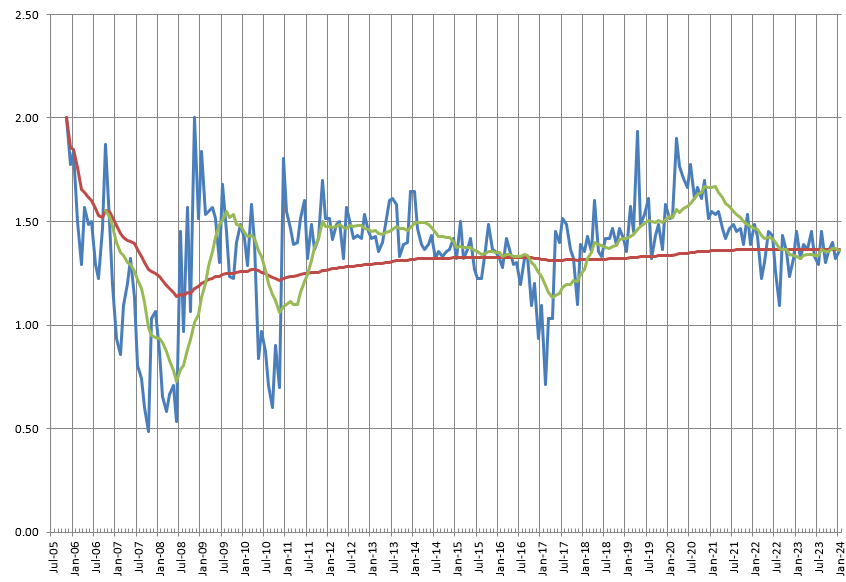
- Flights went up slightly, to 12 segments and 20,541 flight miles (up from 10 and 16,138), the most of either since 2018:

- I visited 5 countries (the UK, Czechia, Austria, Slovakia, and Germany) and 5 US states (California, Wisconsin, Arizona, Indiana, and Michigan). Total time traveling: 156 hours (up from 107).
- Cassie had more fun last year than 2022 as my team went from 2 to 3 days in-office (meaning more time at day camp). She got 372 hours of walks (up from 369) and at least that many hours of couch time.
- Total steps for 2023: 4,619,407 steps and 3,948 km (average: 12,655 per day), up from 4.54m steps and 3,693 km in 2022. I hit my step goal 341 times (327 in 2022), which wasn't bad at all. I also did my longest walk ever on September 1st, 44.45 km.
- Driving? I did several trips to Michigan in the summer, but still only drove 5,009 km (down from 5,925) on 87 L of gasoline (down from 144), averaging 1.7 L/100 km (136 MPG). That's the best fuel economy I've ever gotten with any car for a full year. I last filled up July 30th, and could conceivably go through January on what I've got left in the tank, but it's always best to keep your tank full in super-cold weather.
- Total time at work: 1,905 hours at my real job (up from 1,894) and 73 hours on consulting and side projects, including 640 hours in the office (up from 580), but not including the 91 hours I spent commuting (down from 103). How did I add 60 hours in the office while cutting 12 hours off my commute, I hear you ask? Simple: I live closer to the Metra than I used to, and the 6-10 minutes a day adds up.
- The Apollo Chorus consumed 247 hours in 2023, with 166 hours rehearsing and performing (cf. 220 hours just on the music in 2022). We had fewer performances and an easier fall season, which made a huge difference.
- As for media consumption, I'll leave that to its own post tomorrow.
In all, not a bad year. I hope the trends continue for 2024, though I do expect a few more blog posts this autumn...
Due to an odd combination of holidays, a use-it-or-lose-it floating holiday, and travel, I'm just about done with my first of four short work-weeks in a row. Not that there's anything wrong with that.
Of course, since I would like to finish the coding problem I've been working on before I leave today, I'll have to read some of these later:
- Josh Marshall thinks it's hilarious and pathetic that Rep. Lauren Boebert (R-CO), realizing she can't win against a Democrat in her own district, said she'll run in the next district over.
- Jennifer Rubin points out that while you can blame anyone you want for what's wrong with US politics today, ultimately it's the voters.
- Authors Bob Bauer and Jack Goldsmith argue for the repeal of the Insurrection Act, not just because of the XPOTUS.
- Climate scientist Brian Brettschneider has charted the perfect year-long road-trip across the US where it's always (normally) 21°C.
- A truck driver found himself trapped in an Indiana creek for six days until some fishermen discovered him. (He's OK.)
Finally, police and firefighters in Lancashire, England, are glancing about sheepishly this evening after reports of a fire at Blackpool Tower turned out to be...orange construction netting. They still managed to arrest one person for "breach of the peace," though for what The Guardian didn't report.
One of my friends got this little clock for me:
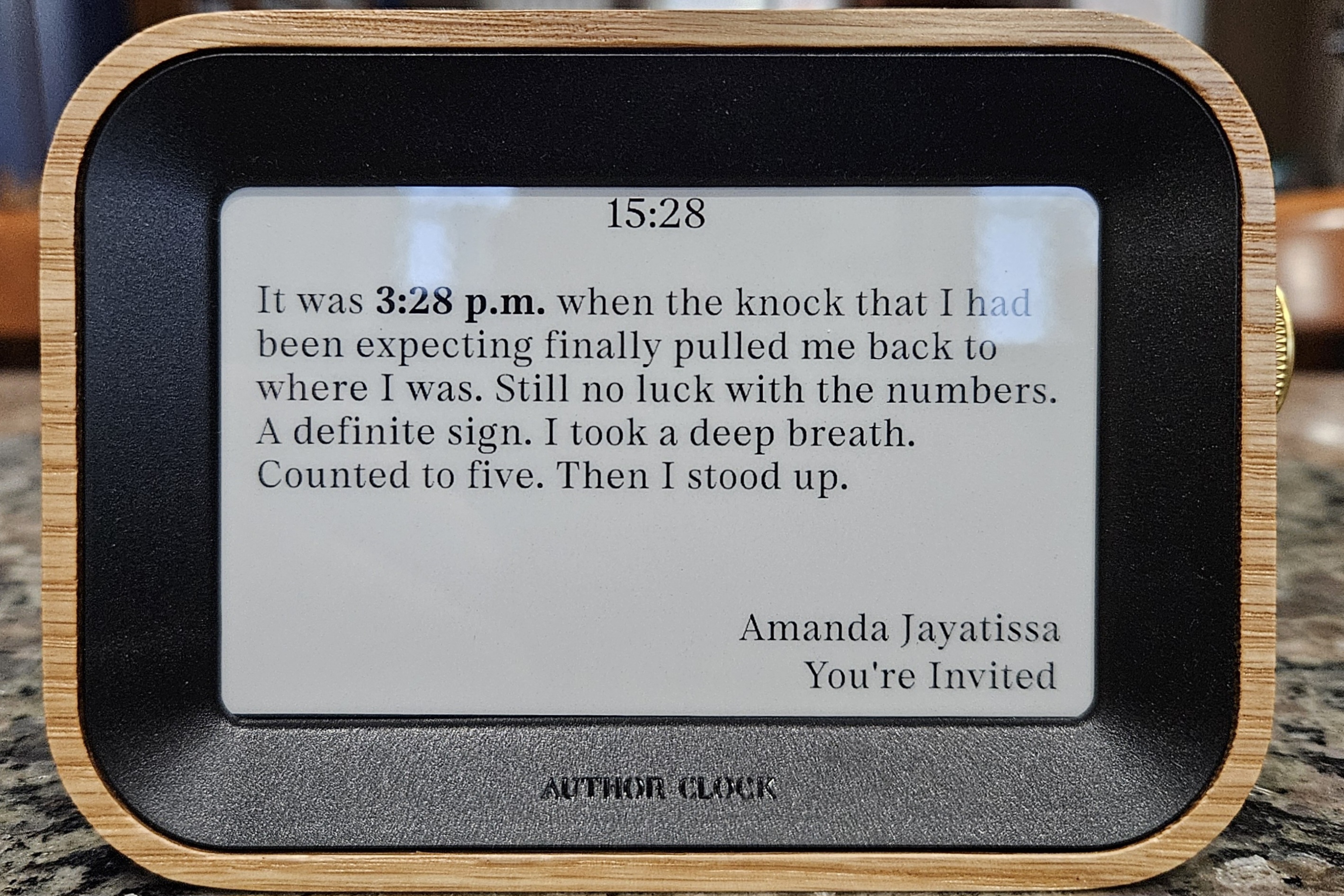
It's an Author Clock. Instead of just the time, it shows a literary quote containing the time. They have well over 1,440 quotes in there (they claim 13,000), and they update frequently, so you may never see the same quote twice.
I had it in my home office for about an hour and got no work done. Because it's that cool.
Cassie and I walked down to Christkindlmarket by Wrigley Field yesterday to meet up with some friends. I understand that the lakefront was completely fogged in, but a kilometer or so inland it just looked creepy:
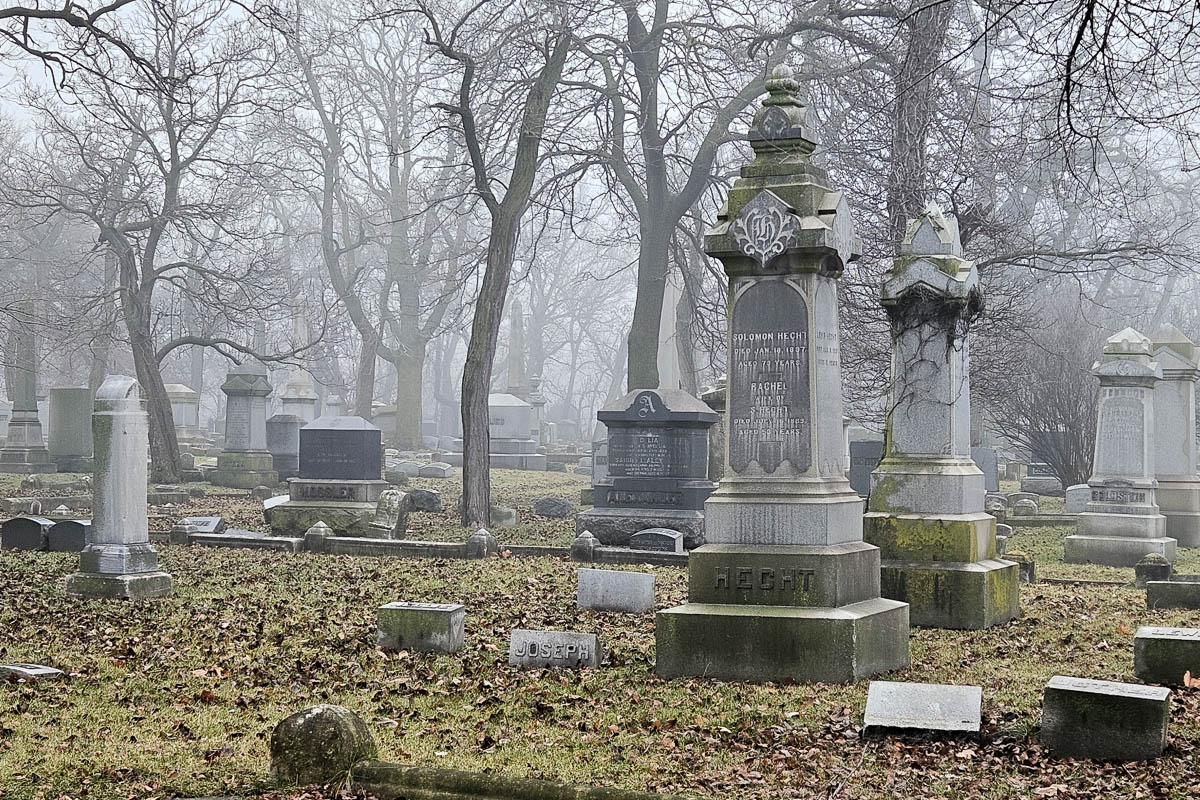
And on the walk home:
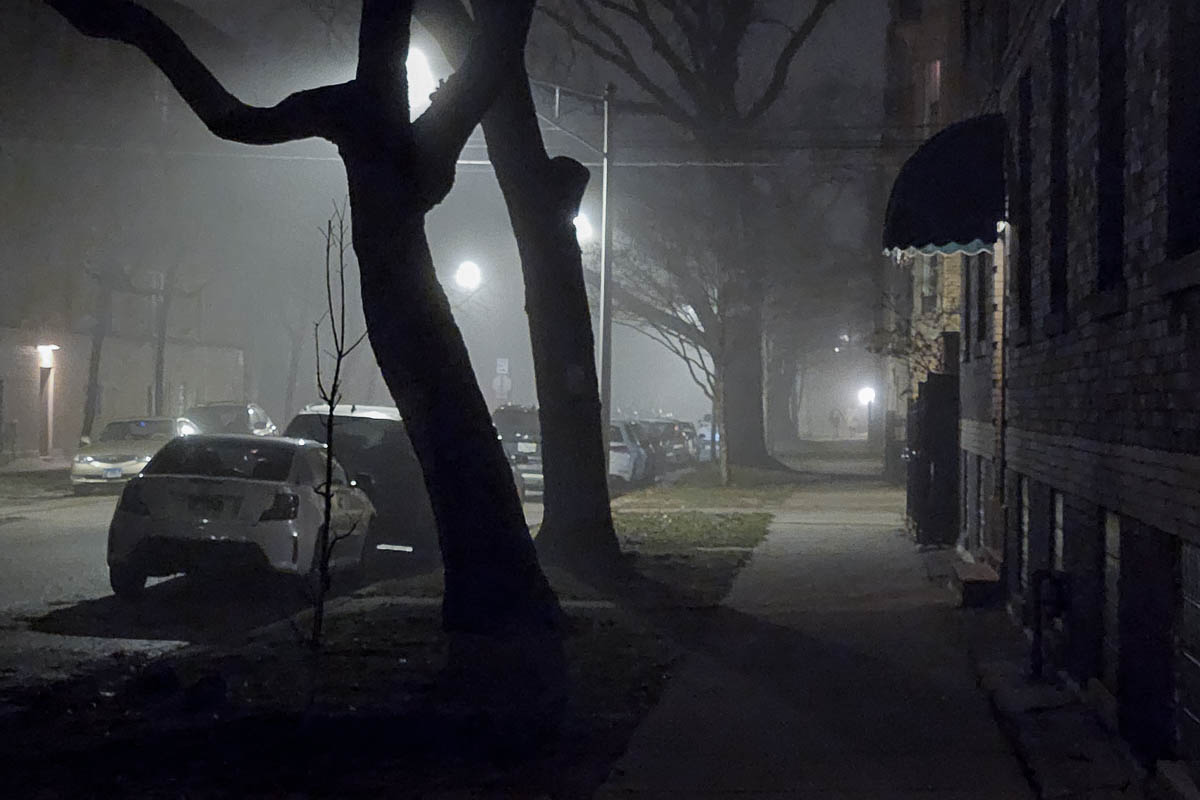
Right now at Inner Drive Technology World Headquarters, the sun has started peeking out, though the temperature-dewpoint spread hasn't gotten that much wider from this morning: 10.9°C with a dewpoint of 10.6°C. O'Hare still reports mist with increasing horizontal visibility but a very low (200 m) ceiling.
As soon as I deploy a bugfix to Weather Now, however, I'm taking Cassie on a 45-minute-or-so walk that will wind up at Spiteful Brewing. We might even sit outside, which is not the usual course of events on Erev Xmas.
As I wait for my rice to cook and my adobo to finish cooking, I'm plunging through an unusually large number of very small changes to a codebase recommended by one of my tools. And while waiting for the CI to run just now, I lined these up for tomorrow morning:
Finally, the CBC has an extended 3-episode miniseries version of the movie BlackBerry available online. I may have to watch that this week.
I just realized that my short complaint about the cold front that came through Saturday was The Daily Parker's 9,000th post since it re-launched as a modern, continuous blog on 13 November 2005. (I still maintain that it was a blog from its inception on 13 May 1998, but the term "blog" hadn't been coined yet.)
In the "modern" era, I've written a mean 495 and a median 505 posts per year, with a standard deviation of 66.3 (1.36, 1.4, and 0.27 per day, respectively).
For the 12 months ending November 30th, I wrote 500 posts at a mean of 1.37 per day and a median of 1.36 per day, standard deviation 0.06. At that rate I will hit 10,000 posts in almost exactly two years, on 10 December 2025.
Thanks for reading!
Our performances at Holy Name Cathedral and Alice Millar Chapel went really well (despite the grumblings of one critic). But part of the fun of serving as president of the chorus meant I got to go back to Holy Name this morning to sign off on 128 chairs and 4 dollies getting into a truck:
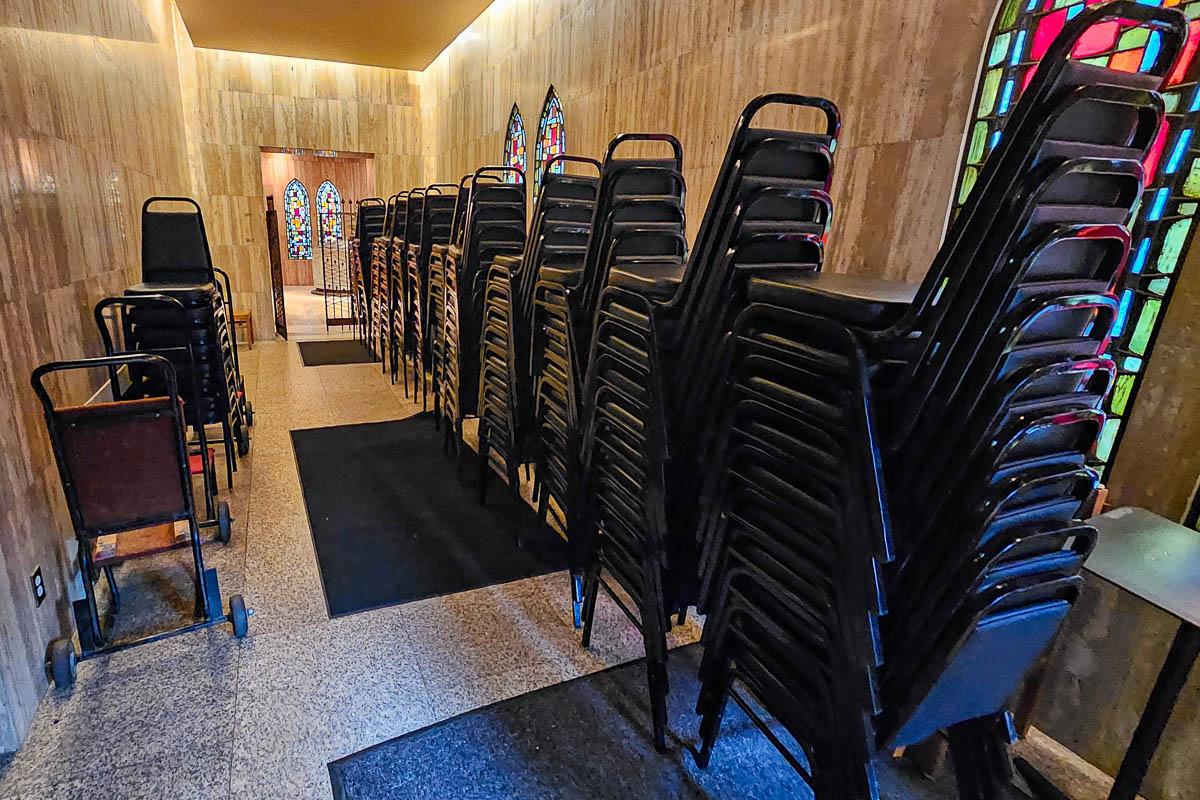
They say Mass at noon every day. The window the rental company gave me was "ESTIMATED to arrive one hour before or after 10:53 AM." They actually showed up at 11:37. Fortunately, I had 4 of the 13 stacks you see above positioned by the door before he arrived, and I got the other 9 trundled across the chancel just in time (11:59). (Only four dollies, only four stacks pre-positioned.)
That said, it really is a beautiful building:

Tomorrow I hope will be a more normal workday. Tonight I hope to get 9 hours of sleep.
With all my rehearsals and performances this week, poor Cassie feels deprived of love and affection, as you can tell:

Regular posting resumes Monday.
After waiting over two hours for our vendor to deliver the orchestra and chorus chairs to Holy Name Cathedral this morning, and our dress rehearsal tonight, plus two performances this coming weekend (the second one at Millar Chapel in Evanston), posting may decline slightly. That said, come to the concerts! We still have seats (pews) available.
I just hope I get enough sleep between now and Sunday...
I don't like getting up before dawn, even if it's 8am as far as my body cares. Except that getting up at 6am Pacific allowed me to get to SFO and through security in less than an hour. That's including showering, checking out of the hotel, catching the BART, and jumping on the airport tram. Cute hotel, too; I'll stay there again if I ever have to fly out of SFO at the ass crack of dawn.
Still an hour to boarding, though. I miss the days when I could get to an airport 45 minutes before departure without breaking a sweat. Though today, maybe I should have slept another half-hour.
Two Brews & Choos Extra Stops coming in the next few days. Plus, I hope, about 18 hours of sleep...